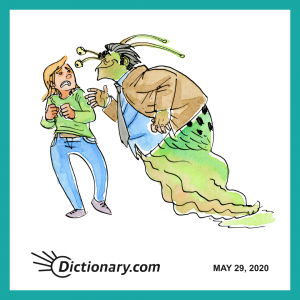Word of the Day
escapism
noun
the avoidance of reality by absorption of the mind in entertainment or in an imaginative situation, activity, etc.
More about escapism
Escapism, originally an Americanism, is a compound of escape and the suffix –ism, first appearing in 1933.
how is escapism used?
Most of us, when we arrive at a particularly trying moment in life, begin to indulge in escapism.
Not that there’s anything wrong with escapism—until escapism is all you’ve got.
escapism


unctuous
adjective
excessively smooth, suave, or smug.
More about unctuous
Unctuous comes from Medieval Latin unctuōsus, “full of grease or soft fat,” a derivative of Latin unguen. All of the Middle English meanings pertain to grease, oil, or fat. It is only in the 18th century that the sense “marked by spiritual unction or holy oil” developed into the extended sense “smooth, suave, or smug,” the most common meaning of the word today. Unctuous entered English in the 14th century.

how is unctuous used?
Dwight Schrute, when last we left him, was regional manager of Dunder Mifflin Paper Company in Scranton, Pa. … He was vainglorious, unctuous, gullible, humorless, vulnerable, fascistic.
His style, moreover, struck her as being far too unctuous and effusive to be sincere.
unctuous


doover
noun
Australian Slang.
thingamabob; thingamajig.
More about doover
Doover is an Australian slang word for thingamabob, thingamajig “something whose name is unknown.” As with many slang terms, an etymology (literally “true story”) for doover does not exist. The Hebrew noun dābhār “word, thing, matter” has been suggested as a source; an alteration of “do for (now)” is more likely.
how is doover used?
I carefully take little plastic doovers from the handle and top, and plier off the frame’s metal retainers without damaging them.
Well, not unlike my husband, who haunts hardware stores for ever newer and more complicated devices and doovers, I have become addicted to shops selling sewing bits and bobs.
doover





